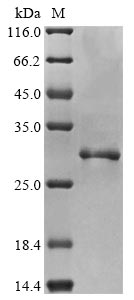Amino acids 1-195 constitute the expression domain of recombinant Human PYCARD. The theoretical molecular weight of the PYCARD protein is 26.7 kDa. The PYCARD protein was expressed in mammalian cell. The PYCARD gene fragment has been modified by fusing the N-terminal 10xHis tag and C-terminal Myc tag, providing convenience in detecting and purifying the recombinant PYCARD protein during the following stages.
Human apoptosis-associated speck-like protein containing a CARD (PYCARD) plays a central role in the assembly of inflammasomes, which are cytoplasmic complexes responsible for activating caspase-1. Upon activation of the inflammasome, PYCARD interacts with procaspase-1 via its CARD domain, facilitating caspase-1 activation. Active caspase-1, in turn, processes pro-IL-1β and pro-IL-18 into their mature and active forms. The release of IL-1β and IL-18 triggers an inflammatory response, recruiting immune cells to the site of infection or injury. This process is crucial for host defense against pathogens but can also contribute to inflammatory diseases when dysregulated. Dysregulation of inflammasome activation, including PYCARD function, has been implicated in various diseases, including autoimmune disorders, neurodegenerative diseases, and inflammatory conditions. Understanding the function of PYCARD provides insights into the molecular mechanisms underlying inflammation and immune responses, with potential implications for therapeutic interventions in diseases associated with aberrant inflammasome activation.






